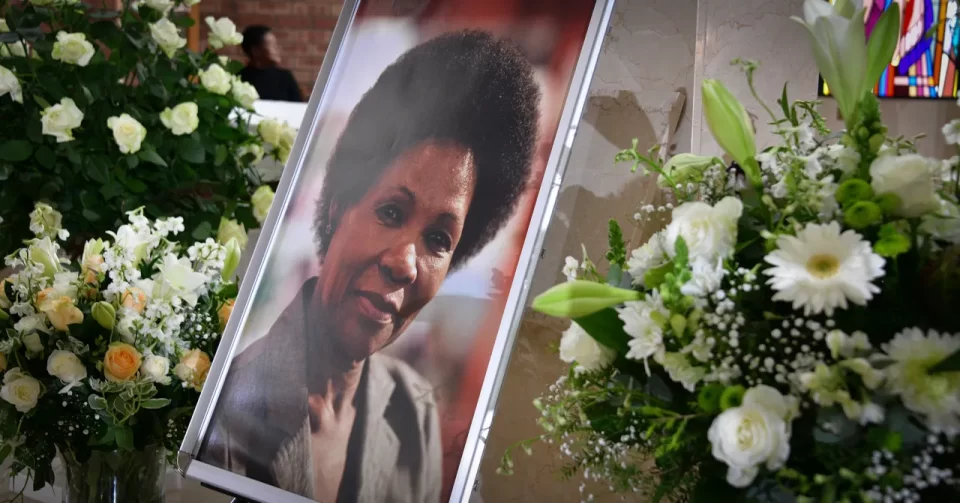PRESIDENT Cyril Matamela Ramaphosa delivered eulogy to former Constitutional Court Justice Yvonne Mokgoro, at a special official funeral at the Bryanston Catholic Church in Johannesburg on Thursday.
Mokgoro died on 9 May at the age of 73.
In 1994, upon its inception, she became the first black woman to be appointed to the Constitutional Court.
She found her calling to become a human rights lawyer in the trenches of struggle, as a student activist and member of the African National Congress in the then Bophuthatswana, and later in the Northern Cape.
Her appointment to the Constitutional Court was the product of many years of both formal and self-study to better herself and to advance in her chosen profession.
It was the fulfilment of a dream in which she never lost faith, even while working in a host of different jobs, as a nursing assistant, a retail salesperson and as a clerk.
It was a progression from a successful career as a legal academic when she produced ground-breaking research on customary law. This all at a time when our jurisprudence and case law around this subject were still evolving.
It was an achievement that followed decades of building a rigorous and demanding career.
The life of Justice Yvonne Mokgoro was the life of untold numbers of black women in this country under apartheid, who bore the triple burden of race, class and gender.
She sought to carve a path for herself at a time when the odds were stacked heavily against women, and against black women in particular.
And yet she went forth with courage, with determination and with the humility that was her trademark.
It is because she understood these struggles so keenly, because she had experienced them first-hand, that Justice Mokgoro was such a passionate and ardent advocate for gender justice.
It is also the reason why she dedicated a substantial part of her time to training and mentoring young female lawyers.
In its tribute to the late Justice Mokgoro, the International Commission of Jurists described her as an inspiration to the next generation of women lawyers.
Justice Mokgoro brought this humanism and commitment to social justice to the Bench.
In her judgment on the court’s very first case, the seminal State v Makwanyane matter involving the death penalty, she expanded on the principle of ubuntu, describing it as “one shared value and ideal that runs like a golden thread across cultural lines”.
During her time on the Bench, in the public interest work she engaged in after she retired in 2009, she was steadfast in her view that regard for human dignity should be the bedrock of jurisprudence everywhere.
This understanding was brought to bear in the positions she held within the United Nations system.
Between 2016 and 2020, Justice Mokgoro chaired the UN’s Internal Justice Council, which is tasked with ensuring independence, professionalism and accountability in the administration of the justice system of the UN.
In the aftermath of the killing of George Floyd in the United States in 2020, which gave birth to the global Black Lives Matter movement, the UN Human Rights Council set up an Independent Expert Mechanism to Advance Racial Justice and Equality in Law Enforcement. Justice Mokgoro was appointed as its first chair.
As South Africa we are immensely proud that our jurists are held in such high regard internationally on matters of human rights, racial discrimination and gender justice.
Alongside her fellow other justices, she affirmed that ubuntu was interwoven with the rights to life, to dignity and to equality.
She wrote several judgments that advanced the socioeconomic rights of society’s most vulnerable.
Much of Justice Mokgoro’s academic research supported legal and policy transformation with respect to the rights of women and children.
This work had a broad span, from the impact of social grants on the lives of indigent women, to issues around customary law, inheritance and succession.
Justice Mokgoro was both a witness to, and a champion of, the transformation of the Bench.
When she was appointed to the Bench 30 years ago, there were approximately 165 judges. Of these, 160 were white men, three were black men, and two were white women.
Today, 45% of our judges are women, 32% are black women.
The late judge received many accolades during her illustrious career.
Her experience and expertise saw her being appointed to a number of advisory boards of entities working to advance human rights both at home and abroad, including the Nelson Mandela Children’s Fund.
It is in recognition of her far-reaching and wide-ranging contribution to our country that she was awarded the Order of the Baobab in 2015.
Justice Yvonne Mokgoro was a woman of indomitable courage and strength.
Just as we mourn her, we also celebrate her. As much as Imbokodo grinds, it also soothes.
She was an exceptional jurist who, alongside her peers on the Constitutional Court, set the highest of standards for the new democratic state. They are standards we will continuously strive to uphold, now and into the future.
And so, drawing on the words of John Donne, we say:
“Death be not proud, though some have called thee mighty and dreadful,
For thou art not so.
For those whom thou think’st thou dost overthrow
Die not.”
The legacy that Justice Yvonne Mokgoro leaves behind is a towering one.
To her family, we share in your sorrow.
May you be comforted by the knowledge that Justice Mokgoro’s life and works continue to inspire and to guide.
May we all have her courage.
May we all have her resilience.
I thank you.
Image GCIS (The late Justice Yvonne Mokgoro was laid to rest on Thursday, at Bryanston- Joburg).

